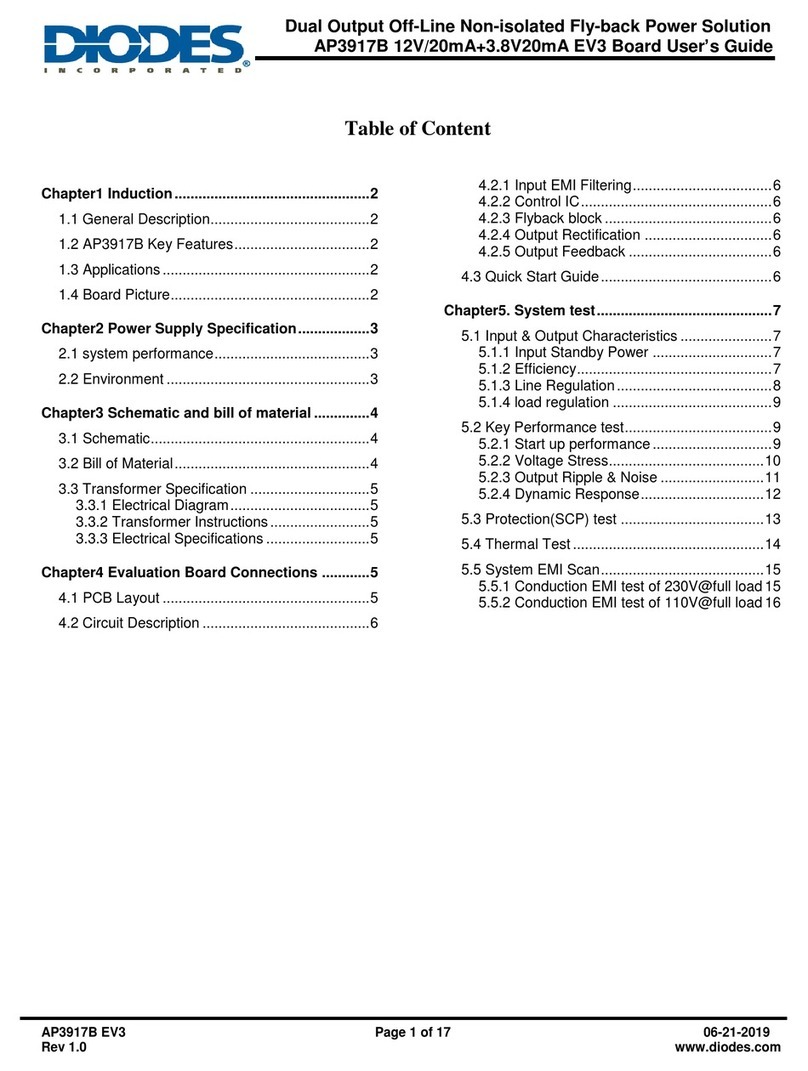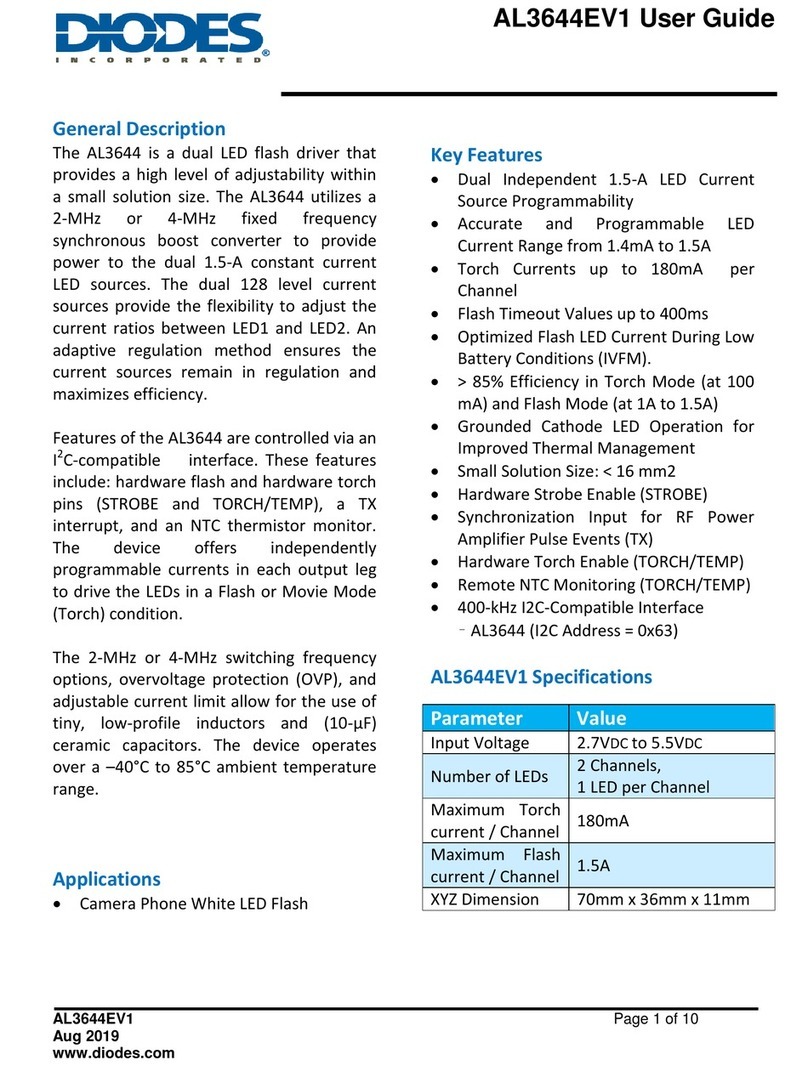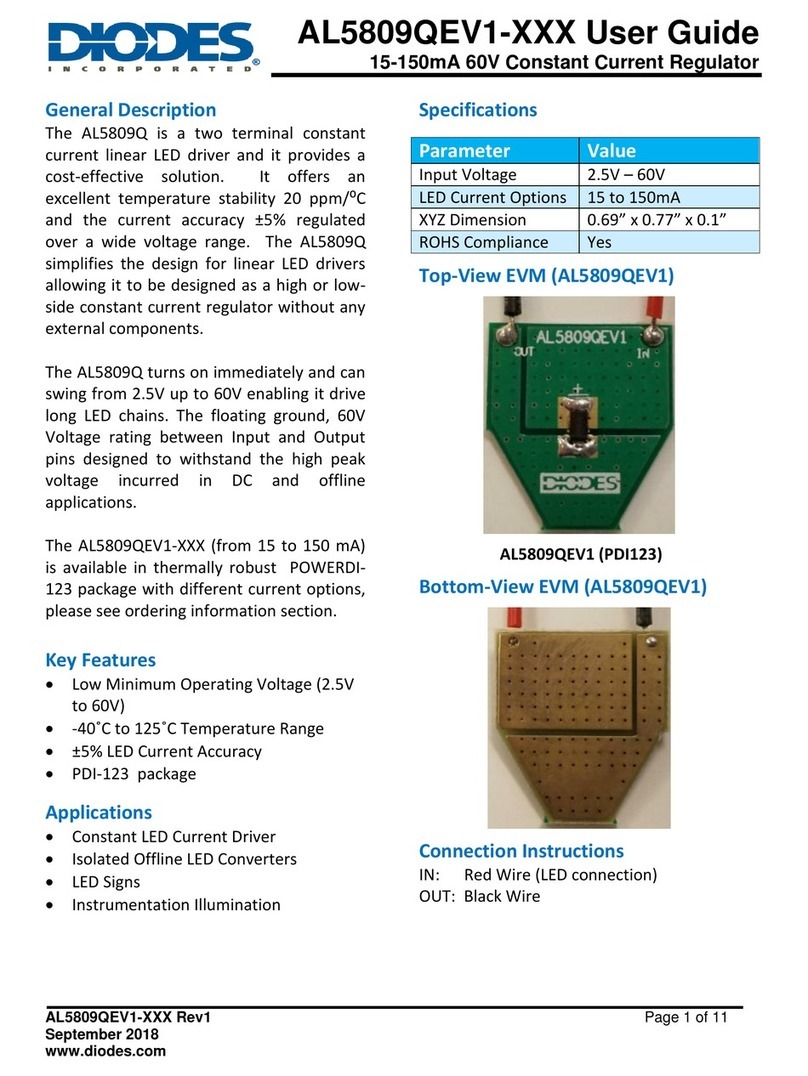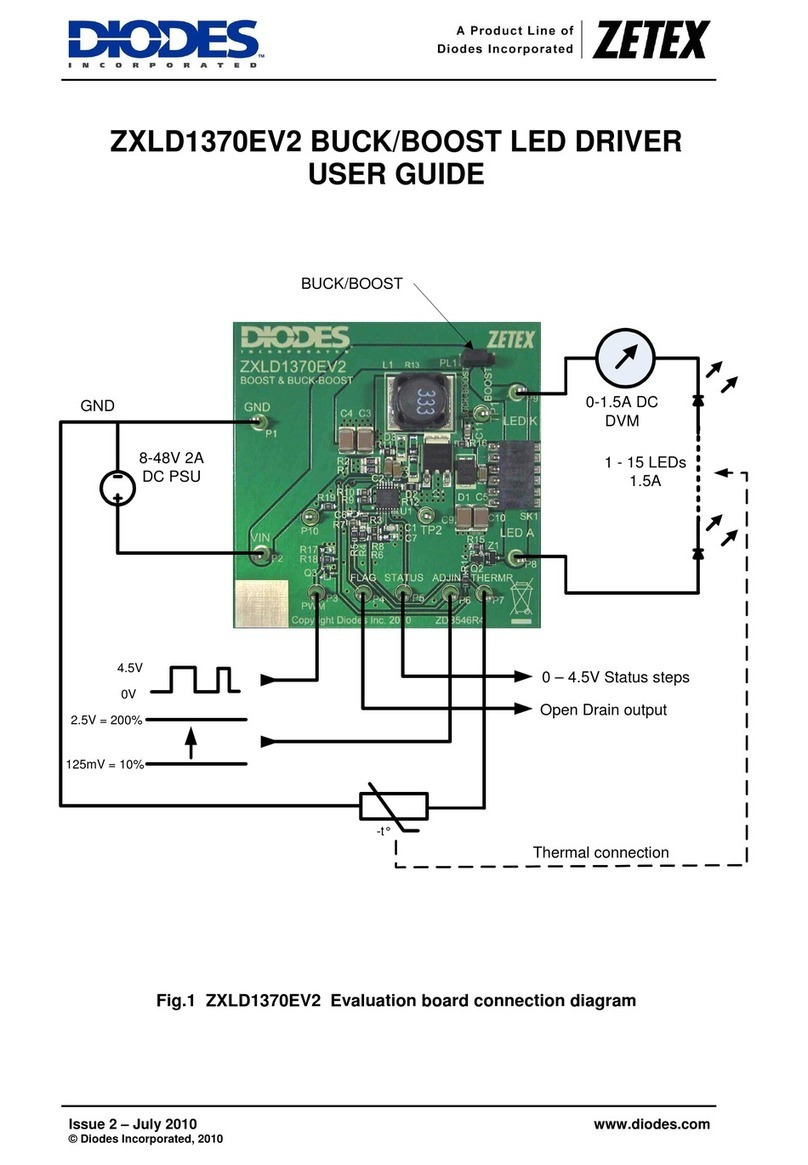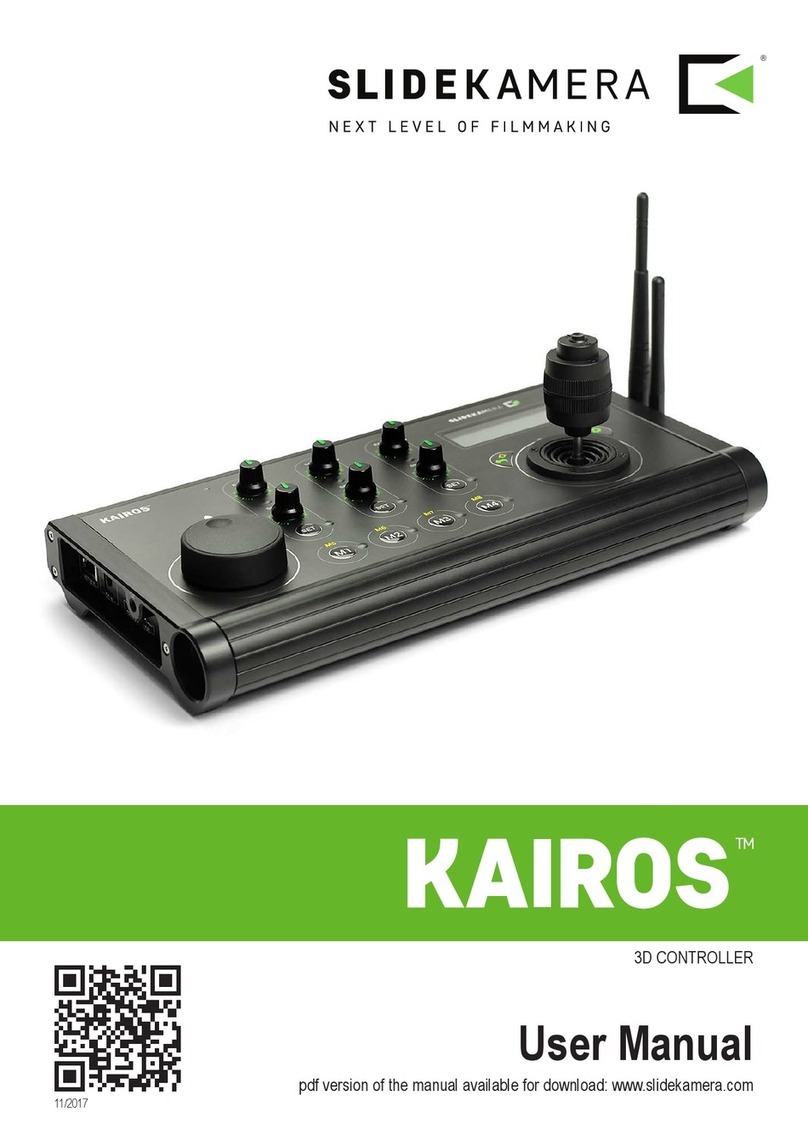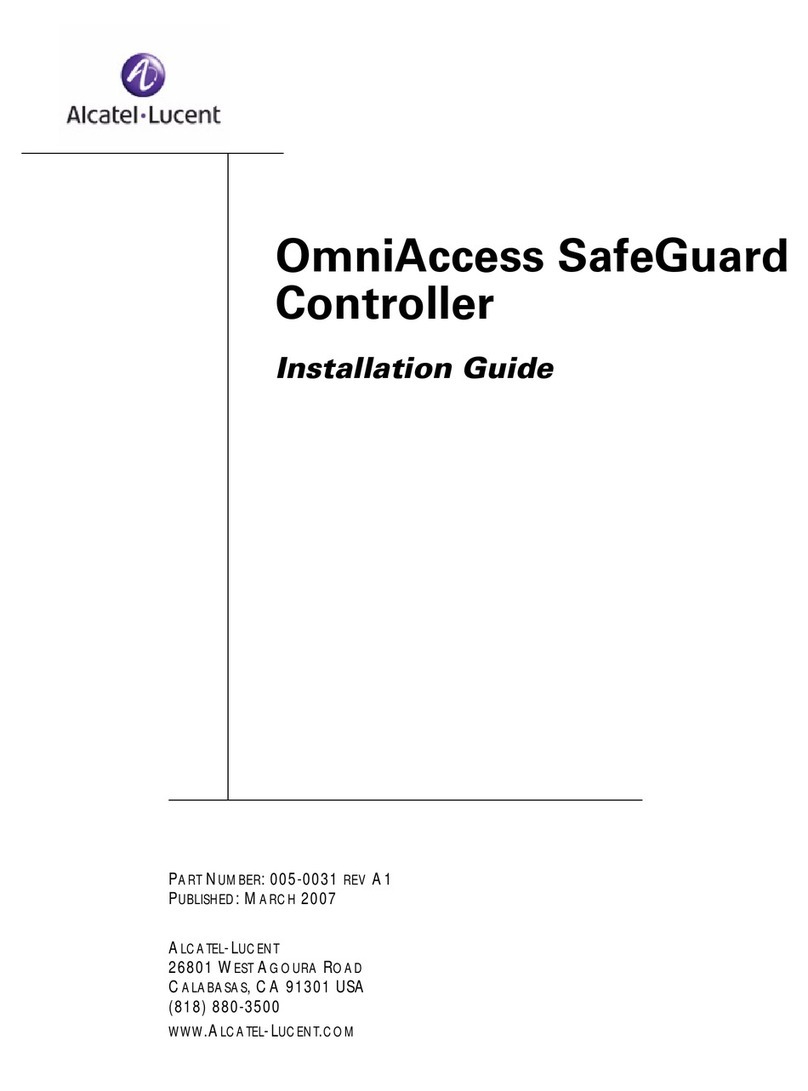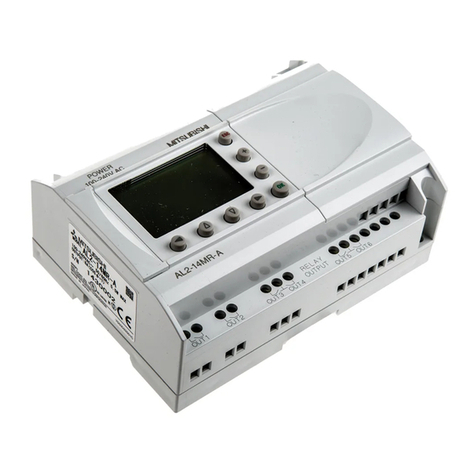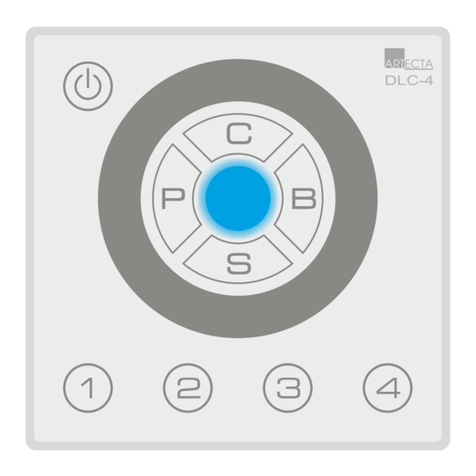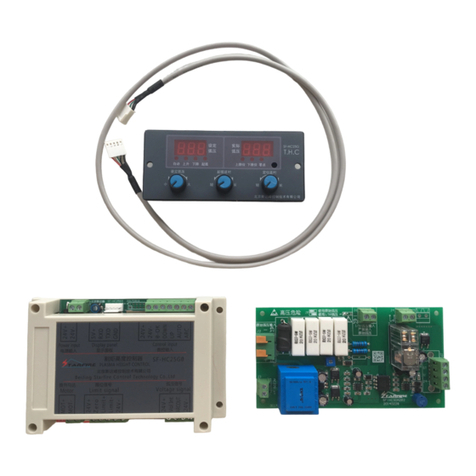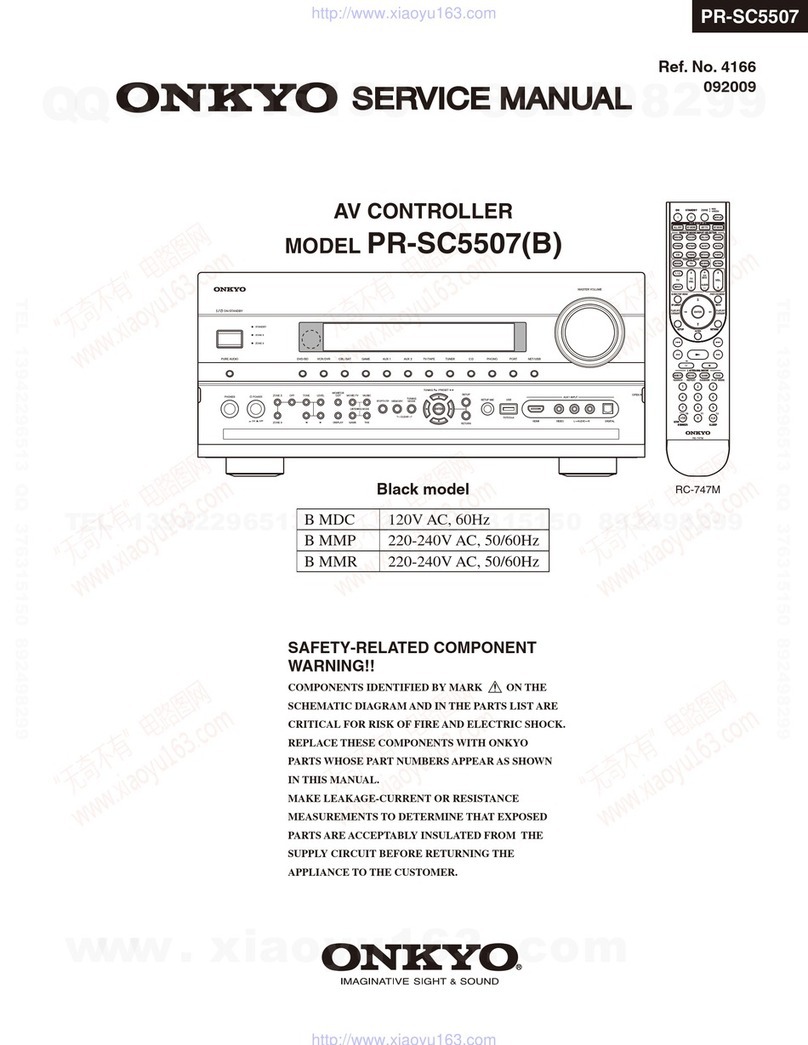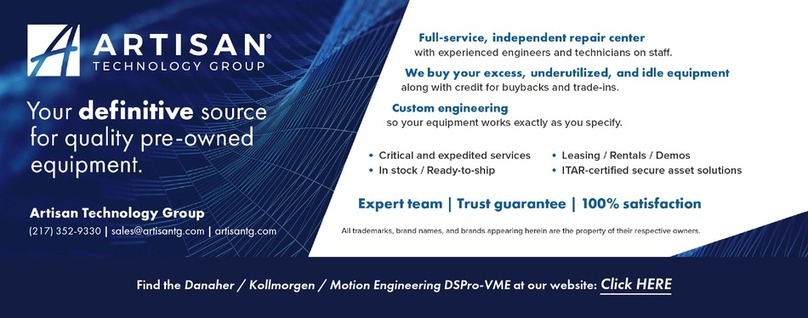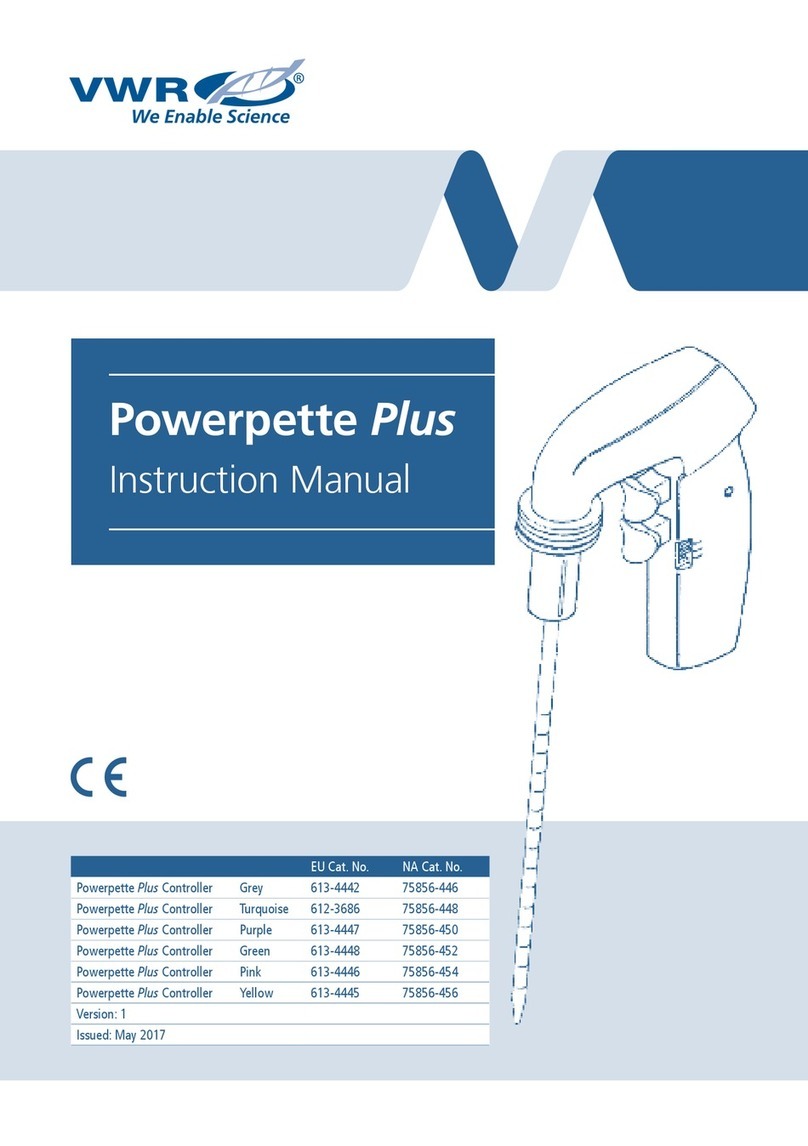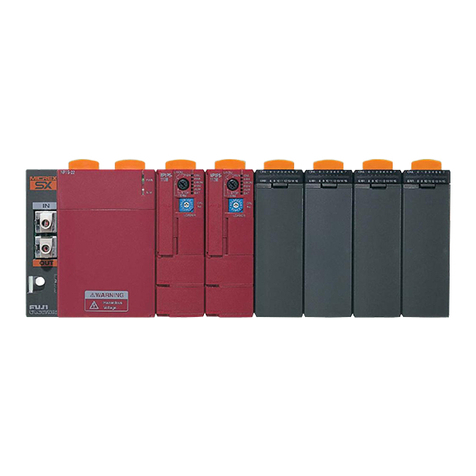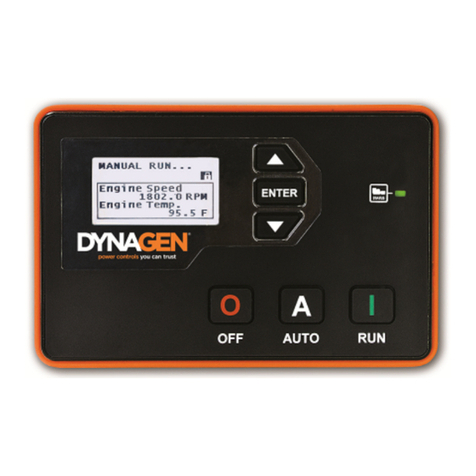Diodes AL3353 EV1 User manual

AL3353EV1 User Guide
High Performance Boost LED Controller
AL3353 Page 1 of 9
Mar.2019
www.diodes.com
General Description
This demonstration board utilizes AL3353 to
build a cost effective solution for boost LED
driver.
AL3353 is a LED driver controller designed
for boost converters in a constant frequency
mode. It implements a peak current mode
control scheme and an internal trans-
conductance amplifier to accurately control
the output current over a wide input and
load conditions.
This user guide contains rich information for
the users. A bill of materials is included that
describes the parts used on this board. A
schematic and PCB layout is also included
along with measured system performance
characteristics and test waveforms. These
materials can be used as a reference
design for your products to improve your
product’s time to market.
Key Features
1. Wide Input Voltage Range: 20V to 36V
2. Constant Current Mode PWM Controller
3. PWM to Analog Dimming Mode
4. Audio Noise Free
5. Built-in Comprehensive Protections
a) Under Voltage Lock Out (UVLO)
b) Over Voltage Protection(OVP)
c) Over Current Protection(OCP)
d) Over Temperature Protection (OTP)
e) LED Open Protection
f) Output Short Protection
g) Diode & Inductor Short Protection
h) LED Cathode Short to GND Protection
6. Low system BOM cost
Applications
LCD TV
LCD Monitor
Flat Panel Display
Specifications
Parameter
Value
Input Voltage
20V ~ 36V
Output Power
48W
Output Current
800mA
Output Voltage
60V
Efficiency
>90 %
Dimension
70mm*50mm
RoHS Compliance
Yes
Evaluation Board
Figure 1: Top View
Figure 2: Bottom View
Connection Instructions:
DC Positive Input: White Test Point (VIN)
DC Negative Input: Black Test Point (GND)
PWM Signal Input: P1 (PWM)
GND Signal Input: P1 (GND)
Positive Output: Yellow Test Point (LEDA)
Negative Output: Black Test Point (LEDK)

AL3353EV1 User Guide
High Performance Boost LED Controller
AL3353 Page 2 of 9
Mar.2019
www.diodes.com
Board Layout
Figure 3: PCB Layout Top View
Figure 4: PCB Layout Bottom View
Quick Start Guide
1. Ensure that the power supply and the PWM signal are switched OFF or disconnected.
2. Connect the LED power supply to the test point “VIN” and “GND”.
3. Connect the LED PWM signal to the test point “PWM” and “GND”.
4. Connect the LED string anode to the test point “LEDA”.
5. Connect the LED string cathode to the test point “LEDK”.
6. Set the PWM signal and turn on the LED power supply. The LED string will light on and
output the preset current.

AL3353EV1 User Guide
High Performance Boost LED Controller
AL3353 Page 3 of 9
Feb.2019
www.diodes.com
Schematic
Figure 5: Schematic Circuit
Bill of Material
Item
Quantity
Package
Description
B1
1
DIP
Ferrite Bead, 50Ω@100MHz
C1
1
DIP
Electrolytic Capacitor, 47uF, 50V, 6.3*11
C3
1
DIP
Electrolytic Capacitor, 100uF, 100V, 10*16
C5
1
0805
Ceramic Capacitor, 1uF, 50V, X7R, ±10%
C6
1
0805
Ceramic Capacitor, 100pF, 16V, X7R, ±10%
C7
1
0805
Ceramic Capacitor, 220nF, 16V, X7R, ±10%
C8
1
0805
Ceramic Capacitor, 470pF, 16V, X7R, ±10%
D1
1
PowerDI5
Schottky Diode, SDT5H100P5, 100V,1A
L1
1
EE1610
Inductor, 100uH, EE1610, 36Ts
Q1
1
TO252
MOSFET, DMT10H010LK3, N Channel, 100V, 8.8mΩ
R1
1
0805
SMD Film Resistor, 475kΩ, ±1%
R2
1
0805
SMD Film Resistor, 13kΩ, ±1%
R3
1
0805
SMD Film Resistor, 10Ω, ±1%
R4
1
0805
SMD Film Resistor, 10kΩ, ±1%
R5
1
0805
SMD Film Resistor, 0Ω, ±1%
R6, R7, R8, R9
4
1206
SMD Film Resistor, 0.4Ω, ±1%
R11, R12, R13
3
1206
SMD Film Resistor, 1.5Ω, ±1%
U1
1
SO-8
IC, AL3353

AL3353EV1 User Guide
High Performance Boost LED Controller
AL3353 Page 4 of 9
Feb.2019
www.diodes.com
System Performance
The AL3353 evaluation board has excellent system performance. With very low BOM cost, the
system can achieve high efficiency and good dimming linearity. To enhance reliability, AL3353
also integrates comprehensive protections.
System Efficiency
Figure 6 shows the efficiency curve. The efficiency is measured with 32V DC input and 20*LED
as load. The efficiency is 95% with 100% duty.
010 20 30 40 50 60 70 80 90 100
0
10
20
30
40
50
60
70
80
90
100
Efficiency(%)
Duty(%)
Figure 6: Efficiency vs PWM Duty
Dimming Performance
AL3353 can support PWM dimming with frequency ranging from 5 kHz to 50 kHz. Figure 7
shows the dimming curve with measured data. AL3353 dimming linearity is quite good with
PWM duty from 1% to 100%.
010 20 30 40 50 60 70 80 90 100
0
10
20
30
40
50
60
70
80
90
100
LED Current Percentage(%)
PWM Duty Cycle (%)
fPWM=5kHz
fPWM=20kHz
fPWM=50kHz
Figure 7: LED Current vs PWM Duty
LED Open Protection
AL3353 monitors the output voltage through the OVP pin. If the LED string is open, the output
voltage will exceed the preset level and the converter will be shut down.

AL3353EV1 User Guide
High Performance Boost LED Controller
AL3353 Page 5 of 9
Feb.2019
www.diodes.com
Figure 8 illustrates the LED open protection procedure. In the waveform, channel 1 (yellow) is
the GATE signal, channel 2 (red) is the COMP signal, channel 3 (blue) is the OVP pin signal,
and channel 4 (green) the LED current. From the waveforms, when VOVP reaches 2.0V, AL3353
enters LED open protection and latches the system.
Figure 8: LED Open Protection with 100% Duty
LED Cathode Short to GND Protection
To prevent LED cathode short to ground, AL3353 monitors the COMP pin voltage. If VCOMP is
continuously greater than 3.2V for 37ms, the converter will be shut down.
Figure 9 depicts the LED cathode short to ground protection procedure. In the waveforms,
channel 1 (yellow) is the GATE signal, channel 2 (red) is the COMP signal, channel 3 (blue) is
the CS signal, and channel 4 (green) the FB signal. From the waveforms, when LED cathode is
short to GND, FB drops to ~0V and VCOMP rises. When VCOMP reaches 3.2V and lasts for ~37
ms, AL3353 enters protection and latches the system.
Figure 9: LED Cathode Short to GND Protection with 100% Duty
VOUT Short Protection
AL3353 monitors the OVP pin voltage. If VOUT is short, VOVP will drop, and if VOVP drops
below 0.25V, the converter will be shut down.

AL3353EV1 User Guide
High Performance Boost LED Controller
AL3353 Page 6 of 9
Feb.2019
www.diodes.com
Figure 10: VOUT Short to GND Protection with 100% Duty
Figure 10 shows the VOUT short to ground protection procedure. In the waveforms, channel 1
(yellow) is the GATE signal, channel 2 (red) is the COMP signal, channel 3 (blue) is the OVP
signal, and channel 4 (green) the LED current. From the waveforms, when VOUT is short to
GND, OVP drops to ~0V, below 0.25V, and then AL3353 enters protection and latches the
system.
Over Temperature Protection
When the junction temperature exceeds 160°C, AL3353 latches and the converter shuts down.
Figure 11: Over Temperature Protection with 50% Duty
Figure 11 illustrates the over temperature protection procedure. In the waveforms, channel 1
(yellow) is the GATE signal, channel 2 (red) is the OVP signal, channel 3 (blue) is the COMP
signal, and channel 4 (green) the LED current. From the waveforms, when the IC junction
temperature exceeds the threshold temperature, AL3353 latches the system.
If the LED anode short to LED cathode protection is required, the diode D2 is in need to prevent
the FB pin from damaging. A diode should be placed to D2 whose peak repetitive reverse
voltage should be no less than 100V and output current should be no less than 2A.

AL3353EV1 User Guide
High Performance Boost LED Controller
AL3353 Page 7 of 9
Feb.2019
www.diodes.com
Constant Voltage Mode
AL3353EV1 can also be configured to work in constant voltage mode. The PWM pin should be
connected to a constant voltage (3.3V / 5V). For the 60V constant voltage output application,
the below modifications should be implemented.
1. A 750kΩ, 1% precision, 0805 package resistor should be placed on R10.
2. R11, R12, R13 should be removed, and R11 be replaced by a 4.99kΩ, 1% precision, 0805
package resistor.
3. C7 should be replaced by a 10nF 0805 capacitor.
The constant output voltage can be measured between LEDA and GND.
System Efficiency
Figure 12 shows the efficiency curve. The efficiency is measured with different load current. The
efficiency of AL3353EV1 constant voltage mode can reach 94% with 24V DC input and 95%
with 32V DC input.
0100 200 300 400 500 600 700 800
0
10
20
30
40
50
60
70
80
90
100
VIN=24V
VIN=32V
Efficiency(%)
Load Current(mA)
Figure 12: Efficiency vs Load Current
Load Regulation
0100 200 300 400 500 600 700 800
55
56
57
58
59
60
61
62
63
64
65
VIN=24V
VIN=32V
Output Voltage(V)
Load Current(mA)
Figure 13: Output Voltage vs Load Current

AL3353EV1 User Guide
High Performance Boost LED Controller
AL3353 Page 8 of 9
Feb.2019
www.diodes.com
Figure 13 shows the output voltage with different load current. The measured output voltage
with 0~800mA load ranges 60.8V to 61.2V. The load regulation rate is 0.6%.
Line Regulation
Figure 14 shows the output voltage with different input voltage. With 20V ~ 36V DC input, the
output voltage at 800mA load ranges from 61.24V to 61.10V. The line regulation rate is 0.2%.
20 22 24 26 28 30 32 34 36
55
56
57
58
59
60
61
62
63
64
65
Output Voltage(V)
Input Voltage(V)
Figure 14: Output Voltage vs Input Voltage
Load Transient
The load transient waveform in Figure 15 is measured with the load current switching from 0mA
to 800mA, rising slew rate 1A/μs, and from 800mA to 0mA, falling slew rate 1A/μs. When
loading, the output voltage drops to 52.75V for a very short time. When unloading, the maximum
output voltage is 65.10V.
Figure 15: Load Transient with 32V Input

AL3353EV1 User Guide
High Performance Boost LED Controller
AL3353 Page 9 of 9
Feb.2019
www.diodes.com
IMPORTANT NOTICE
DIODES INCORPORATED MAKES NO WARRANTY OF ANY KIND, EXPRESS OR IMPLIED, WITH REGARDS TO THIS
DOCUMENT, INCLUDING, BUT NOT LIMITED TO, THE IMPLIED WARRANTIES OF MERCHANTABILITY AND FITNESS FOR A
PARTICULAR PURPOSE (AND THEIR EQUIVALENTS UNDER THE LAWS OF ANY JURISDICTION).
Diodes Incorporated and its subsidiaries reserve the right to make modifications, enhancements, improvements, corrections or other
changes without further notice to this document and any product described herein. Diodes Incorporated does not assume any
liability arising out of the application or use of this document or any product described herein; neither does Diodes Incorporated
convey any license under its patent or trademark rights, nor the rights of others. Any Customer or user of this document or products
described herein in such applications shall assume all risks of such use and will agree to hold Diodes Incorporated and all the
companies whose products are represented on Diodes Incorporated website, harmless against all damages.
Diodes Incorporated does not warrant or accept any liability whatsoever in respect of any products purchased through unauthorized
sales channel.
Should Customers purchase or use Diodes Incorporated products for any unintended or unauthorized application, Customers shall
indemnify and hold Diodes Incorporated and its representatives harmless against all claims, damages, expenses, and attorney fees
arising out of, directly or indirectly, any claim of personal injury or death associated with such unintended or unauthorized
application.
Products described herein may be covered by one or more United States, international or foreign patents pending. Product names
and markings noted herein may also be covered by one or more United States, international or foreign trademarks.
LIFE SUPPORT
Diodes Incorporated products are specifically not authorized for use as critical components in life support devices or systems
without the express written approval of the Chief Executive Officer of Diodes Incorporated. As used herein:
A. Life support devices or systems are devices or systems which:
1. are intended to implant into the body, or
2. support or sustain life and whose failure to perform when properly used in accordance with instructions for use provided
in the labeling can be reasonably expected to result in significant injury to the user.
B. A critical component is any component in a life support device or system whose failure to perform can be reasonably expected
to cause the failure of the life support device or to affect its safety or effectiveness.
Customers represent that they have all necessary expertise in the safety and regulatory ramifications of their life support devices or
systems, and acknowledge and agree that they are solely responsible for all legal, regulatory and safety-related requirements
concerning their products and any use of Diodes Incorporated products in such safety-critical, life support devices or systems,
notwithstanding any devices- or systems-related information or support that may be provided by Diodes Incorporated. Further,
Customers must fully indemnify Diodes Incorporated and its representatives against any damages arising out of the use of Diodes
Incorporated products in such safety-critical, life support devices or systems.
Copyright © 2019, Diodes Incorporated
www.diodes.com
Table of contents
Other Diodes Controllers manuals
Popular Controllers manuals by other brands
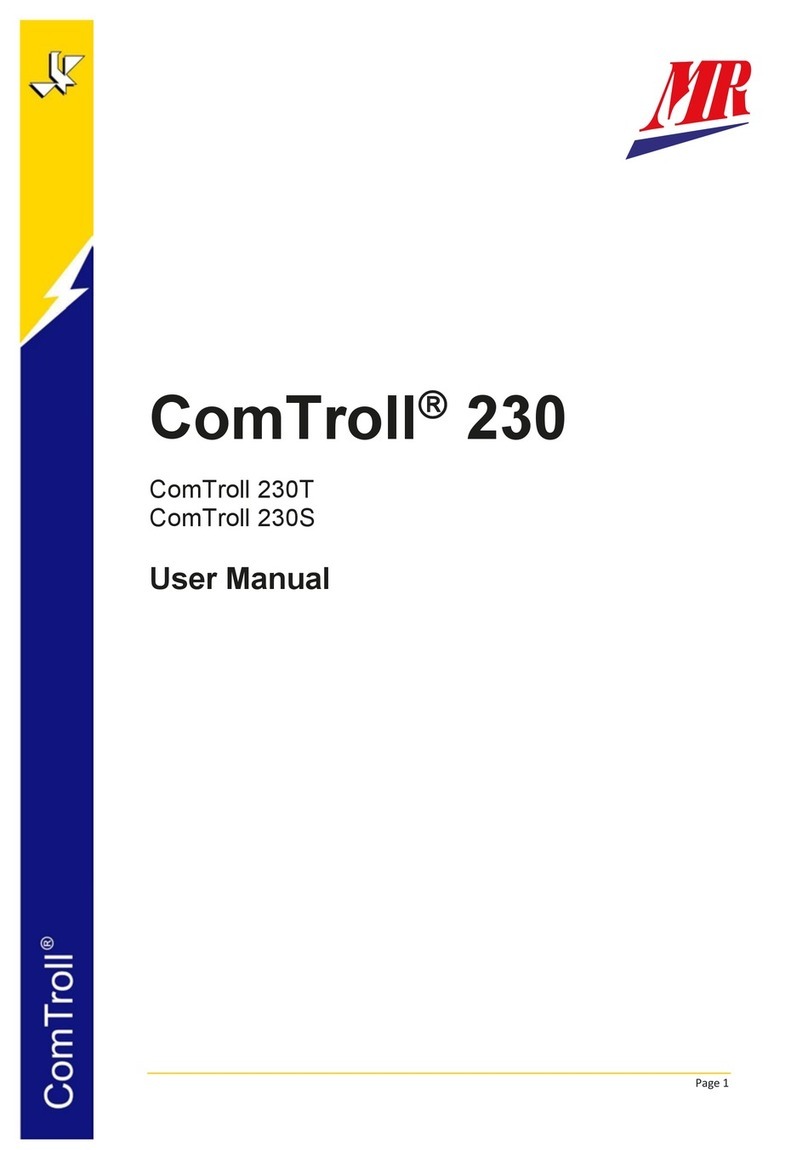
Nortroll
Nortroll ComTroll 230 user manual
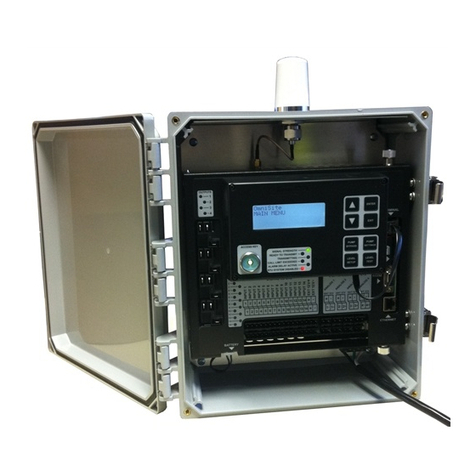
OmniSite
OmniSite Crystal Ball user guide
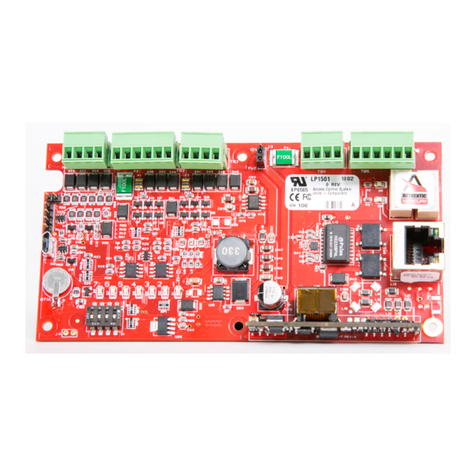
Mercury Security
Mercury Security LP1501 Installations and specifications
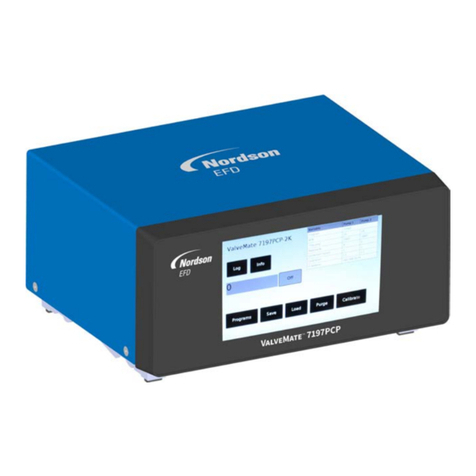
Nordson
Nordson ValveMate 7197PCP-2K quick start guide
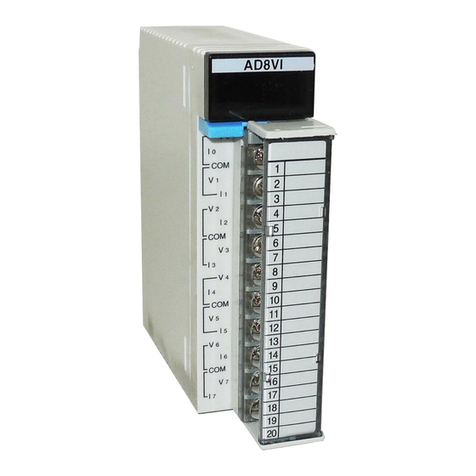
Panasonic
Panasonic FP2 -C1A manual
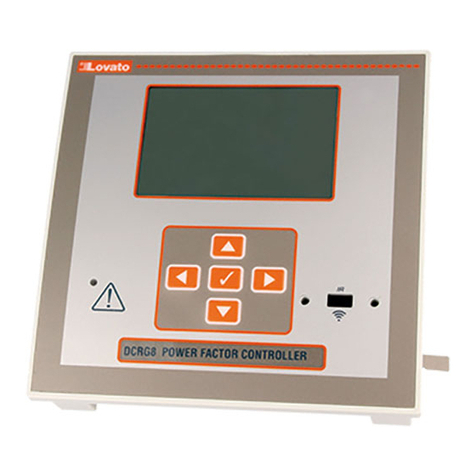
LOVATO ELECTRIC
LOVATO ELECTRIC INSTALLATION MANUAL installation manual
